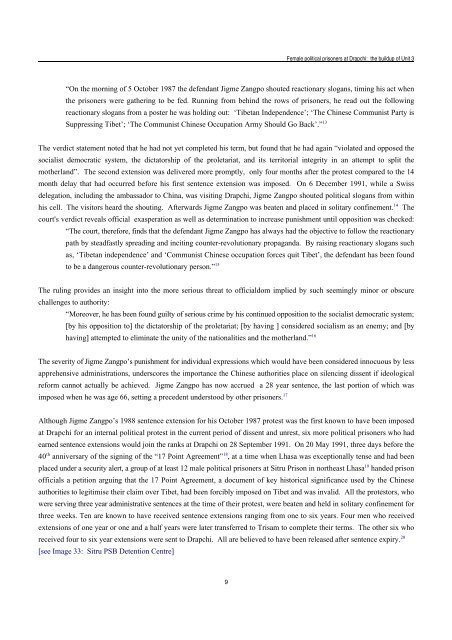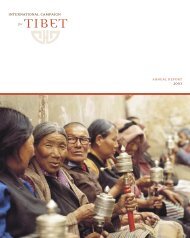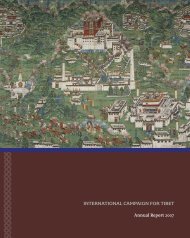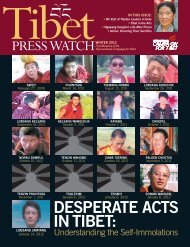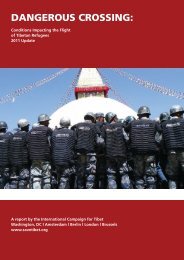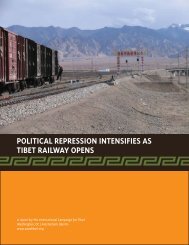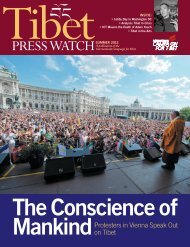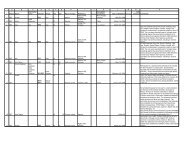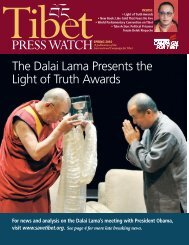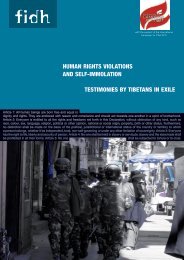Rukhag 3: The Nuns of Drapchi PrisonB. Emergence of precedents: protest and punishmenti. 1987 - 1991: male political prisoner protests at Drapchi and SitruSealing political prisoners within Units 3 and 5 and attempting to re<strong>for</strong>m <strong>the</strong>m with political re-education had minimalsuccess. Their influence on <strong>the</strong> wider body of inmates was constrained but core beliefs went unre<strong>for</strong>med, even if expressionsof <strong>the</strong>m were generally restrained. Political protest occurred at Drapchi soon after <strong>the</strong> arrival of <strong>the</strong> first political prisonersdetained during <strong>the</strong> unrest of <strong>the</strong> late 1980s, with <strong>the</strong> first known instance occurring among <strong>the</strong> men of Unit 5 in December1990, who by <strong>the</strong>n numbered more than 90. Lhagpa Tsering, a middle school student detained at age 17 in October 1989,while martial law was in <strong>for</strong>ce, had been charged along with four o<strong>the</strong>r students of “ganging up toge<strong>the</strong>r to establish a9counter-revolutionary organisation”. They had created <strong>the</strong> “Snow Lion Youth Organization” and set about printing leaflets,posters, and making replicas of <strong>the</strong> <strong>Tibet</strong>an flag. Lhagpa, sentenced to three years, died in custody on 15 December 1990,following beating and torture. When <strong>the</strong> male political prisoners staged a protest that same day, People’s Armed Police (PAP)troops were summoned and <strong>the</strong> inmates beaten. One of <strong>the</strong> prisoners, Sonam Wangdu, <strong>report</strong>edly required hospitalisation.Visitors on <strong>the</strong> next scheduled visiting day were <strong>report</strong>edly given an unusual offering of tea and food along with <strong>the</strong> suggestion10that <strong>the</strong>y shouldn’t speak about <strong>the</strong> swollen faces and bruises <strong>the</strong>y saw. Sonam Wangdu would be released on medicalparole, a paraplegic, in 1993; he died in March 1999. 11Thus, as early as 1990, <strong>the</strong> Drapchi authorities had demonstrated <strong>the</strong> capacity to inflict heavy beatings on an entire group ofprisoners as a means of discouraging and punishing those who continued to exhibit <strong>the</strong> defiance which had earned <strong>the</strong>mprison sentences in <strong>the</strong> first place.Extensions to sentences could be applied as well. Tanag Jigme Zangpo, a school teacher whose third imprisonment <strong>for</strong>counter-revolution began in 1983 when he was 57, had already received two extensions to that sentence by early 1992, both<strong>for</strong> carefully timed solo protests in Drapchi. According to <strong>the</strong> 1983 verdict, his initial 15 year sentence had also been earned<strong>for</strong> solitary expressions of dissent, chief among <strong>the</strong>m that he “openly pasted a personally written wall-poster on a wall in <strong>the</strong>sou<strong>the</strong>rn part of Tsug Lhakhang [Jokhang Temple] criticising <strong>the</strong> leadership of our country”. The sentencing documentrevealed <strong>the</strong> heightened significance attached to a pattern of defiance ra<strong>the</strong>r than a single instance of this behaviour with <strong>the</strong>statement that Jigme Zangpo “has previously served prison terms on <strong>the</strong> guilt of counter-revolutionary crimes, [but] has never12seriously re-considered his past crimes”. The judgement stated that:“Even after <strong>the</strong> defendant was arrested, he continued to propagate and support reactionary views; openly raisedreactionary slogans; sang <strong>the</strong> <strong>Tibet</strong>an national an<strong>the</strong>m; and on top of this, continued to claim that he will struggle<strong>for</strong> ‘<strong>Tibet</strong>an independence’.”Jigme Zangpo's first sentence extension of five years was handed down on 30 November 1988, more than a year after anincident on 5 October 1987. Prisoners had learned of <strong>the</strong> mass demonstrations in central Lhasa, only two kilometres southof Drapchi. Jigme Zangpo, <strong>report</strong>edly in an ef<strong>for</strong>t to support those protests, staged his own protest which is described asfollows in <strong>the</strong> official sentencing document:8
Female political prisoners at Drapchi: <strong>the</strong> buildup of Unit 3“On <strong>the</strong> morning of 5 October 1987 <strong>the</strong> defendant Jigme Zangpo shouted reactionary slogans, timing his act when<strong>the</strong> prisoners were ga<strong>the</strong>ring to be fed. Running from behind <strong>the</strong> rows of prisoners, he read out <strong>the</strong> followingreactionary slogans from a poster he was holding out: ‘<strong>Tibet</strong>an Independence’; ‘The Chinese Communist Party isSuppressing <strong>Tibet</strong>’; ‘The Communist Chinese Occupation Army Should Go Back’.” 13The verdict statement noted that he had not yet completed his term, but found that he had again “violated and opposed <strong>the</strong>socialist democratic system, <strong>the</strong> dictatorship of <strong>the</strong> proletariat, and its territorial integrity in an attempt to split <strong>the</strong>mo<strong>the</strong>rland”. The second extension was delivered more promptly, only four months after <strong>the</strong> protest compared to <strong>the</strong> 14month delay that had occurred be<strong>for</strong>e his first sentence extension was imposed. On 6 December 1991, while a Swissdelegation, including <strong>the</strong> ambassador to China, was visiting Drapchi, Jigme Zangpo shouted political slogans from within14his cell. The visitors heard <strong>the</strong> shouting. Afterwards Jigme Zangpo was beaten and placed in solitary confinement. Thecourt's verdict reveals official exasperation as well as determination to increase punishment until opposition was checked:“The court, <strong>the</strong>re<strong>for</strong>e, finds that <strong>the</strong> defendant Jigme Zangpo has always had <strong>the</strong> objective to follow <strong>the</strong> reactionarypath by steadfastly spreading and inciting counter-revolutionary propaganda. By raising reactionary slogans suchas, ‘<strong>Tibet</strong>an independence’ and ‘Communist Chinese occupation <strong>for</strong>ces quit <strong>Tibet</strong>’, <strong>the</strong> defendant has been foundto be a dangerous counter-revolutionary person.” 15The ruling provides an insight into <strong>the</strong> more serious threat to officialdom implied by such seemingly minor or obscurechallenges to authority:“Moreover, he has been found guilty of serious crime by his continued opposition to <strong>the</strong> socialist democratic system;[by his opposition to] <strong>the</strong> dictatorship of <strong>the</strong> proletariat; [by having ] considered socialism as an enemy; and [byhaving] attempted to eliminate <strong>the</strong> unity of <strong>the</strong> nationalities and <strong>the</strong> mo<strong>the</strong>rland.” 16The severity of Jigme Zangpo’s punishment <strong>for</strong> individual expressions which would have been considered innocuous by lessapprehensive administrations, underscores <strong>the</strong> importance <strong>the</strong> Chinese authorities place on silencing dissent if ideologicalre<strong>for</strong>m cannot actually be achieved. Jigme Zangpo has now accrued a 28 year sentence, <strong>the</strong> last portion of which was17imposed when he was age 66, setting a precedent understood by o<strong>the</strong>r prisoners.Although Jigme Zangpo’s 1988 sentence extension <strong>for</strong> his October 1987 protest was <strong>the</strong> first known to have been imposedat Drapchi <strong>for</strong> an internal political protest in <strong>the</strong> current period of dissent and unrest, six more political prisoners who hadearned sentence extensions would join <strong>the</strong> ranks at Drapchi on 28 September 1991. On 20 May 1991, three days be<strong>for</strong>e <strong>the</strong>th 1840 anniversary of <strong>the</strong> signing of <strong>the</strong> “17 Point Agreement” , at a time when Lhasa was exceptionally tense and had been19placed under a security alert, a group of at least 12 male political prisoners at Sitru Prison in nor<strong>the</strong>ast Lhasa handed prisonofficials a petition arguing that <strong>the</strong> 17 Point Agreement, a document of key historical significance used by <strong>the</strong> Chineseauthorities to legitimise <strong>the</strong>ir claim over <strong>Tibet</strong>, had been <strong>for</strong>cibly imposed on <strong>Tibet</strong> and was invalid. All <strong>the</strong> protestors, whowere serving three year administrative sentences at <strong>the</strong> time of <strong>the</strong>ir protest, were beaten and held in solitary confinement <strong>for</strong>three weeks. Ten are known to have received sentence extensions ranging from one to six years. Four men who receivedextensions of one year or one and a half years were later transferred to Trisam to complete <strong>the</strong>ir terms. The o<strong>the</strong>r six whoreceived four to six year extensions were sent to Drapchi. All are believed to have been released after sentence expiry. 20[see Image 33: Sitru PSB Detention Centre]9
- Page 4 and 5: Tibet Information NetworkTibet Info
- Page 8 and 9: Table of Contents1. Introduction ..
- Page 10 and 11: Image 15: Gyabdrag Nunnery, in the
- Page 12: Rukhag 3: The Nuns of Drapchi Priso
- Page 15 and 16: Female political prisoners at Drapc
- Page 17: Female political prisoners at Drapc
- Page 21 and 22: Female political prisoners at Drapc
- Page 23 and 24: Female political prisoners at Drapc
- Page 25 and 26: Female political prisoners at Drapc
- Page 27 and 28: Female political prisoners at Drapc
- Page 29 and 30: Female political prisoners at Drapc
- Page 31 and 32: Female political prisoners at Drapc
- Page 33 and 34: Female political prisoners at Drapc
- Page 35 and 36: Female political prisoners at Drapc
- Page 37 and 38: Unit 3 and the Drapchi protests of
- Page 39 and 40: Unit 3 and the Drapchi protests of
- Page 41 and 42: Unit 3 and the Drapchi protests of
- Page 43 and 44: Unit 3 and the Drapchi protests of
- Page 45 and 46: Unit 3 and the Drapchi protests of
- Page 47 and 48: Unit 3 and the Drapchi protests of
- Page 49 and 50: Unit 3 and the Drapchi protests of
- Page 51 and 52: Unit 3 and the Drapchi protests of
- Page 53 and 54: Unit 3 and the Drapchi protests of
- Page 55 and 56: Unit 3 and the Drapchi protests of
- Page 57 and 58: Unit 3 and the Drapchi protests of
- Page 59 and 60: Unit 3 and the Drapchi protests of
- Page 61 and 62: Unit 3 and the Drapchi protests of
- Page 63 and 64: Unit 3 and the Drapchi protests of
- Page 65 and 66: Unit 3 and the Drapchi protests of
- Page 67 and 68: Unit 3 and the Drapchi protests of
- Page 69 and 70:
Conclusion4. ConclusionThe women no
- Page 71 and 72:
Appendices5. AppendicesPrisoner lis
- Page 73 and 74:
Appendices500Tibetan political pris
- Page 75 and 76:
List 2: Drapchi Prison: Unit 3 nuns
- Page 77 and 78:
TIN# status code name lay name det.
- Page 79 and 80:
List 4: Female political prisoners
- Page 81 and 82:
TIN # status code name lay name det
- Page 83 and 84:
TIN# status code name lay name det.
- Page 85 and 86:
TIN # status code name lay name det
- Page 87 and 88:
TIN # status code name lay name det
- Page 89 and 90:
List 8c: Male Tibetan political pri
- Page 91 and 92:
List 10: Female political prisoners
- Page 93 and 94:
4 495-0442 REL Ngawang Tenzin Yangd
- Page 95 and 96:
95-0074 REL Tsultrim Choedron Tseri
- Page 97 and 98:
EndnotesPrefecture, to the west of
- Page 99 and 100:
Endnotes40. TIN Doc 399 names the d
- Page 101 and 102:
Endnotes75. TIN Doc 39976. TIN Doc
- Page 103 and 104:
EndnotesNgawang Sungrab was taken t
- Page 105 and 106:
Endnotes159. TIN Doc 1(sd). Sonam T
- Page 107 and 108:
Images6. ImagesA. Nuns and nunnerie
- Page 109 and 110:
ImagesExtended sentences, currently
- Page 111 and 112:
ImagesImage 13: Chubsang Nunnery, o
- Page 113 and 114:
ImagesImage 15: Gyabdrag Nunnery, i
- Page 115 and 116:
ImagesImage 16b: Mechungri Nunnery,
- Page 117 and 118:
ImagesImage 18: Shar Bumpa Nunnery,
- Page 119 and 120:
ImagesB. Drapchi PrisonImage 20: Dr
- Page 121 and 122:
ImagesImage 21: Drapchi Prison, lat
- Page 123 and 124:
ImagesImage 23: Drapchi Prison, are
- Page 125 and 126:
ImagesImage 25: Drapchi Prison, are
- Page 127 and 128:
ImagesImage 27: Drapchi Prison, are
- Page 129 and 130:
ImagesImage 29: Drapchi Prison, are
- Page 131 and 132:
ImagesImage 30: Lhasa Prison (forme
- Page 133 and 134:
ImagesImage 32: new prison in Sangy
- Page 135 and 136:
ImagesImage 34: Trisam Re-education
- Page 137:
127Images


